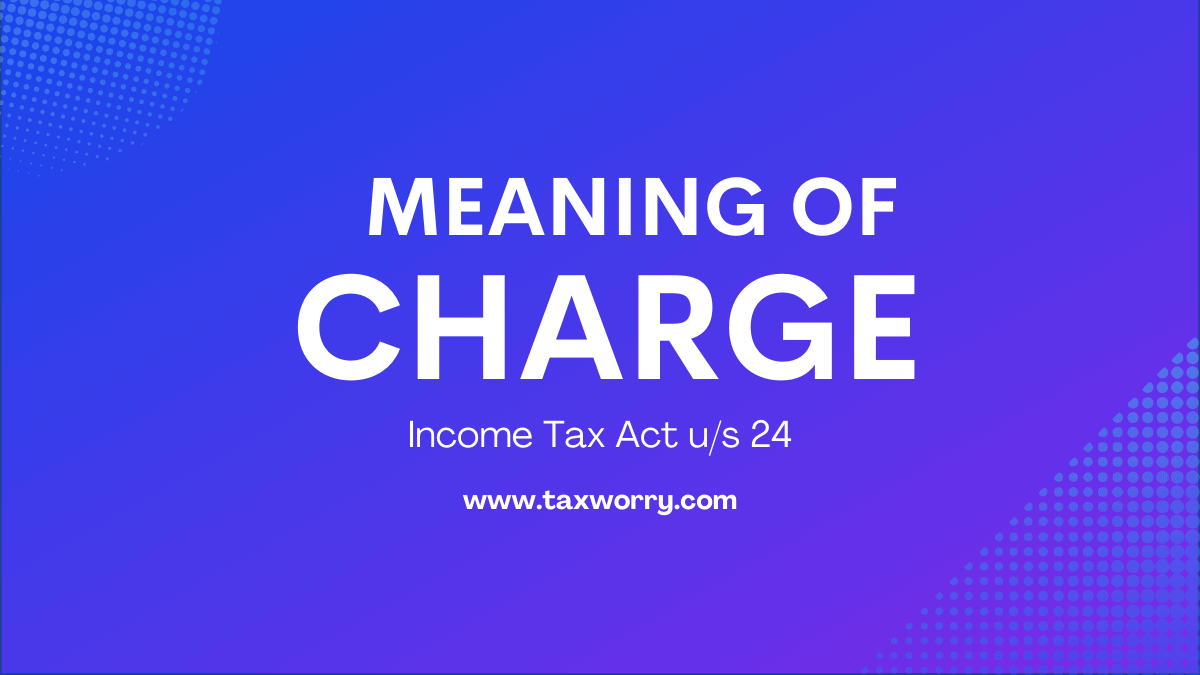Meaning of tax terms
Meaning of “Charge”
The meaning of charge under section 24 of the Income Tax Act is not defined in the act itself. But we can take guidance from decisions by various high courts. Here are excerpts of courts orders in which the Hon’ble High Court tried to explain the meaning of charge.

Meaning of charge defined by court
The phrase ‘charge’ used in section 24 of the Income Tax Act came up before various high courts as detailed under :
1. Hon’ble Madras high court explained the meaning of ‘charge’ while delivering judgment in A.V.R.A. Veerappa chettiar Vs. CIT [1959] 35 ITR 322 (Mad.) as under :
Meaning : The word ‘charge’ in the statutory expression ‘an annual charge’ in section 9(1)(iv) of the 1922 act connotes something more than a mere liability to pay, something more than the annual payment. Both the concepts involves, liability to pay and a charge on the house property for the discharge of that liability. That charge can be contractual or statutory. It can be expressed or it can be implied. If, for instance, the income from the property is shown as the source from which the liability is to be discharged, law would imply a charge for that amount.
2. Hon’ble Bombay high court explained the meaning of ‘charge’ while delivering judgment in Director of income-tax (exemption) v. Sheth mafatlal gangalbhai foundation (trust) [ITA nos. 267 To 272 (Bom.) Of 2000, dated 11-10-2000] as under :
Section : 159 to 179
Meaning : The word ‘charge’ in section 164 means ‘levy’. 231
Section 24 of Income Tax Act
Deductions from income from house property.
24. Income chargeable under the head “Income from house property” shall be computed after making the following deductions, namely:—
(a) a sum equal to thirty per cent of the annual value;
(b) where the property has been acquired, constructed, repaired, renewed or reconstructed with borrowed capital, the amount of any interest payable on such capital:
Provided that in respect of property referred to in sub-section (2) of section 23, the amount of deduction 80[or, as the case may be, the aggregate of the amount of deduction] shall not exceed thirty thousand rupees :
Provided further that where the property referred to in the first proviso is acquired or constructed with capital borrowed on or after the 1st day of April, 1999 and such acquisition or construction is completed within five years from the end of the financial year in which capital was borrowed, the amount of deduction 81[or, as the case may be, the aggregate of the amounts of deduction] under this clause shall not exceed two lakh rupees.
Explanation.—Where the property has been acquired or constructed with borrowed capital, the interest, if any, payable on such capital borrowed for the period prior to the previous year in which the property has been acquired or constructed, as reduced by any part thereof allowed as deduction under any other provision of this Act, shall be deducted under this clause in equal instalments for the said previous year and for each of the four immediately succeeding previous years:
Provided also that no deduction shall be made under the second proviso unless the assessee furnishes a certificate, from the person to whom any interest is payable on the capital borrowed, specifying the amount of interest payable by the assessee for the purpose of such acquisition or construction of the property, or, conversion of the whole or any part of the capital borrowed which remains to be repaid as a new loan.
Explanation.—For the purposes of this proviso, the expression “new loan” means the whole or any part of a loan taken by the assessee subsequent to the capital borrowed, for the purpose of repayment of such capital:
[Provided also that the aggregate of the amounts of deduction under the first and second provisos shall not exceed two lakh rupees.]
In this article, you can get guidance from high courts on the meaning of charge under section 24 of the Income Tax Act.
Updated up to Finance Act 2021
